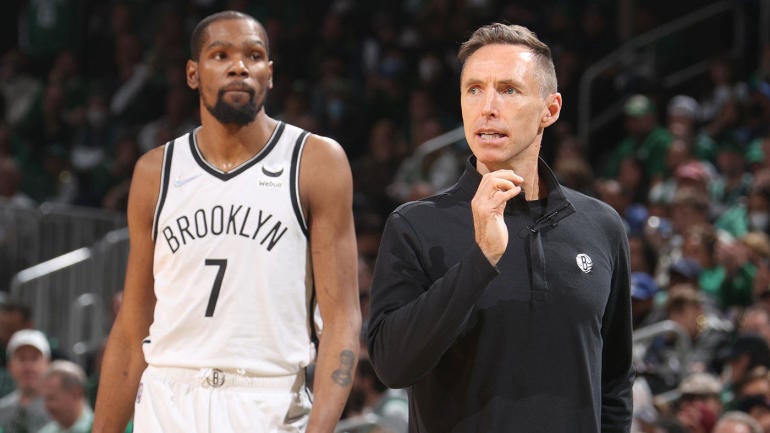
Steve Nash is gone. The Brooklyn Nets' problems are not.
On Tuesday, in deciding to "part ways" with their embattled head coach, the Nets simply looked at the three-ring circus that often doubles for an NBA organization and opted to oust the guy easiest to fire.
There's no easy way to know if Steve Nash, a beloved Hall of Fame player who had exactly zero coaching experience before his appointment in 2020, qualifies as a good head coach. His tenure has disguised his excellence or shortcomings -- everything about him and this team has faded behind the normal eclipse one can see when surrounded by massive stars.
But Nash's tenure was also shrouded in an all-time high level of dysfunction, ego, and ugliness. All of this has combined to make it very difficult to assess Nash the coach. It's like coaching LeBron James: There will be diminished credit (ask Frank Vogel or Erik Spoelstra) or extra blame (ask Frank Vogel) when coaching a player of that magnitude, and in the end, fair or not, the axe falls to you first.
The only thing that's certain about Nash's tenure in Brooklyn is that it was destined to fail. What happened Tuesday wasn't a consequence of his coaching. It was a consequence of the decisions general manager Sean Marks made several years ago to trade a young, up-and-coming, high-culture-no-star squad for this failed Nets experiment.
Kevin Durant, Kyrie Irving and James Harden are massively talented players, and Ben Simmons is -- or was -- one himself. But the Durant-Irving-Harden trident, replaced last year at least on paper by a Durant-Irving-Simmons version, was always more troubling and fragile than its power on paper.
Irving's long list of chemistry-killing antics hit an ugly, non-basketball low this week, but he's always been brutally difficult to successfully coach -- or, perhaps, just brutally unlikely to be successful. Other than hitting that shot in the 2016 NBA Finals against the Golden State Warriors, the juice has never been worth the squeeze. The Celtics learned that the hard way. So, now, have the Brooklyn Nets, from the no-shows at work, the flat-earthism, the COVID-19 vaccine saga, the assertion the Nets had no head coach even before Nash had started, the shots at LeBron, and so on.
And that's just a small list of Irving's baggage.

CBS Sports HQ Newsletter
Your Ultimate Guide to Every Day in Sports
We bring sports news that matters to your inbox, to help you stay informed and get a winning edge.
Thanks for signing up!
Keep an eye on your inbox.
Sorry!
There was an error processing your subscription.
Durant is a massively talented, all-time player, but like Irving, he bristled at some part of sharing the spotlight on an NBA championship team and found life away from it not as easy as expected. His own baggage, basketball greatness notwithstanding, came to a climax in the offseason when he demanded he be traded -- unless Nets owner Joe Tsai fire Nash and Marks.
To make such a demand, shortly after signing a new, long-term deal, takes a special kind of flippancy. Steph Curry has never approached such a move. Nor LeBron James. Leadership, often, is difficult.
Tasi waited until Tuesday to fulfill that first Durant requirement, but the poison had long been in the bloodstream by that point.
Once a star calls for your job, that job is in jeopardy, and the likelihood of team struggles and toxicity is high. This 2-5 Nets start wasn't the reason Nash was fired. It was an extension of the broken culture and baggage-laden stars who have shaped it.
Harden knew. He forced his way out of a dumpster fire last year shortly after making the same mistake Nash had made, when he looked at K.D. and Kyrie and saw the talent rather than the troubles that would define life with the Nets.
And then there's Simmons, the walking punchline, a player so diminished from his once excellent if imperfect form he could be an avatar for this Nets organization.
They're a mess. They have no real leadership. Their loudest voice promotes antisemitic garbage, seems unable to accept the words "I was wrong" and is a wonderful basketball player whose returns on investment have always come back -- without LeBron James as a teammate -- in the red.
Their most important voice may have been one shoe size from an NBA Finals, but he's also tread so heavily on Nash, Marks and anyone who dared question him that pettiness has often overshadowed his incredible game and often thoughtful and interesting worldview. This is clearly a team dynamic crafted in his image.
Nash may be a great coach. He may be an awful one. He may be somewhere in between. But Tuesday's news isn't a verdict on any of that.
Steve Nash's exit from Brooklyn simply confirms what should have been obvious all along. This franchise is a mess, and that starts -- or ends -- with its dysfunctional, underwhelming, disappointing superstars.


















